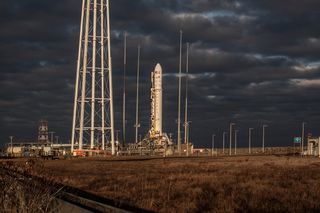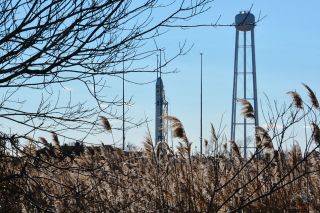Private Cygnus Supply Ship 'Go' for Frigid Launch Wednesday

Update for Jan. 8: The planned launch of an Orbital Sciences Cygnus cargo ship to the International Space Station has been delayed due to high solar radiation from an intense solar flare on Tuesday. Read the full story here: Huge Solar Flare Delays Private Rocket Launch to Space Station
WALLOPS ISLAND, Va. — A commercial spacecraft bound for the International Space Station is cleared to launch from Virginia's frigid Eastern Shore Wednesday (Jan. 8) in a milestone delivery mission for its builder, Orbital Sciences Corp.
The unmanned Cygnus cargo ship is slated to blast off Wednesday at 1:32 p.m. EST (1832 GMT) on the first Orbital Sciences resupply mission under a $1.9 billion contract between the company and NASA. The gleaming silver spacecraft will launch atop an Antares rocket, also built by Orbital Sciences, from a pad here at NASA's Wallops Flight Facility.
"From an [International Space Station] perspective, we're good to go," NASA's space station program manager Dan Hartman said in a mission update Wednesday. "We are really looking forward to this first Orbital cargo mission." [Photos: Orbital's 1st Cygnus Cargo Mission in Pictures]
Orbital's Cygnus spacecraft is packed with 2,780 pounds (1,260 kilograms) of supplies for the six astronauts on the space station. That haul includes a veritable cornucopia of science experiments for the crew, including 33 tiny cubesat satellites to be launched from the station and 23 experiments designed by students on Earth.
The spacecraft is also carrying a space ant farm to study how ants behave in weightlessness — an experiment to study the ants' swarm intelligence that could help improve mathematical procedures for solving complex problems, NASA officials said.
Freezing rocket launch
Get the Space.com Newsletter
Breaking space news, the latest updates on rocket launches, skywatching events and more!
The Dulles, Va.-based Orbital Sciences hoped to launch the Cygnus mission, called Orb-1, to the space station in mid-December, but an unrelated cooling system malfunction on the orbiting lab forced NASA to delay the flight while astronauts performed emergency spacewalk repairs. Orbital later rescheduled the launch for Jan. 7, then delayed the mission due to the extreme freezing temperatures blanketing much of the United States this week.
"The extended cold temperatures definitely produce some unique challenges for us," Orbital's Antares rocket program director Mike Pinkston told reporters.
Orbital launch rules require temperatures of at least 20 degrees Fahrenheit (minus 6 degrees Celsius) in order to fly. Over the last few days, Orbital technicians have weathered sub-freezing temperatures and biting wind-chill by working in shorter shifts and taking shelter in a heated truck when needed.
"The main thing is keeping everybody warm and safe, with no frostbite," Pinkston said.
Wednesday is forecast to be warmer, however, and officials say there's a 95 percent chance that the weather will be good enough for the Antares to get off the ground.
Orbital Sciences is one of two commercial spaceflight companies tapped by NASA to fly unmanned cargo delivery mission to the space station under billion-dollar contracts. The other company is Hawthorne, Calif.-based SpaceX, which has launched two of 12 missions to the station using its Falcon 9 rockets and Dragon space capsules.
Orbital's first Antares rocket and Cygnus test flights launched in 2013, but Wednesday's mission will mark the company's first of eight official delivery missions under its $1.9 billion contract with NASA.

Commercial spaceflight's big year
The Orb-1 mission comes on the heels of a Monday SpaceX launch of a Falcon 9 rocket from Florida. That mission lofted the commercial Thaicom 6 communications satellite into orbit from Cape Canaveral Air Force Station — the first commercial launch of 2014.
"This is going to be a big week for spaceflight in the U.S.," said Orbital executive vice president Frank Culbertson, a former NASA astronaut, as he congratulated SpaceX's successful launch. "I think you're going to see that the United States is going to build up our launch rate."
NASA retired its space shuttle fleet in 2011 and now relies on Orbital Sciences and SpaceX to launch delivery missions to the space station. The U.S. agency is also reliant on cargo ships launched by Russia, Japan and Europe to keep the station stocked, and Russian Soyuz spacecraft to ferry astronauts to and from the orbiting lab.
NASA plans to rely on U.S.-built commercial spacecraft to fly American astronauts to the space station once they become available.
Email Tariq Malik at tmalik@space.com or follow him @tariqjmalik and Google+. Follow us @Spacedotcom, Facebook and Google+. Original article on SPACE.com.
Join our Space Forums to keep talking space on the latest missions, night sky and more! And if you have a news tip, correction or comment, let us know at: community@space.com.

Tariq is the Editor-in-Chief of Space.com and joined the team in 2001, first as an intern and staff writer, and later as an editor. He covers human spaceflight, exploration and space science, as well as skywatching and entertainment. He became Space.com's Managing Editor in 2009 and Editor-in-Chief in 2019. Before joining Space.com, Tariq was a staff reporter for The Los Angeles Times covering education and city beats in La Habra, Fullerton and Huntington Beach. In October 2022, Tariq received the Harry Kolcum Award for excellence in space reporting from the National Space Club Florida Committee. He is also an Eagle Scout (yes, he has the Space Exploration merit badge) and went to Space Camp four times as a kid and a fifth time as an adult. He has journalism degrees from the University of Southern California and New York University. You can find Tariq at Space.com and as the co-host to the This Week In Space podcast with space historian Rod Pyle on the TWiT network. To see his latest project, you can follow Tariq on Twitter @tariqjmalik.
